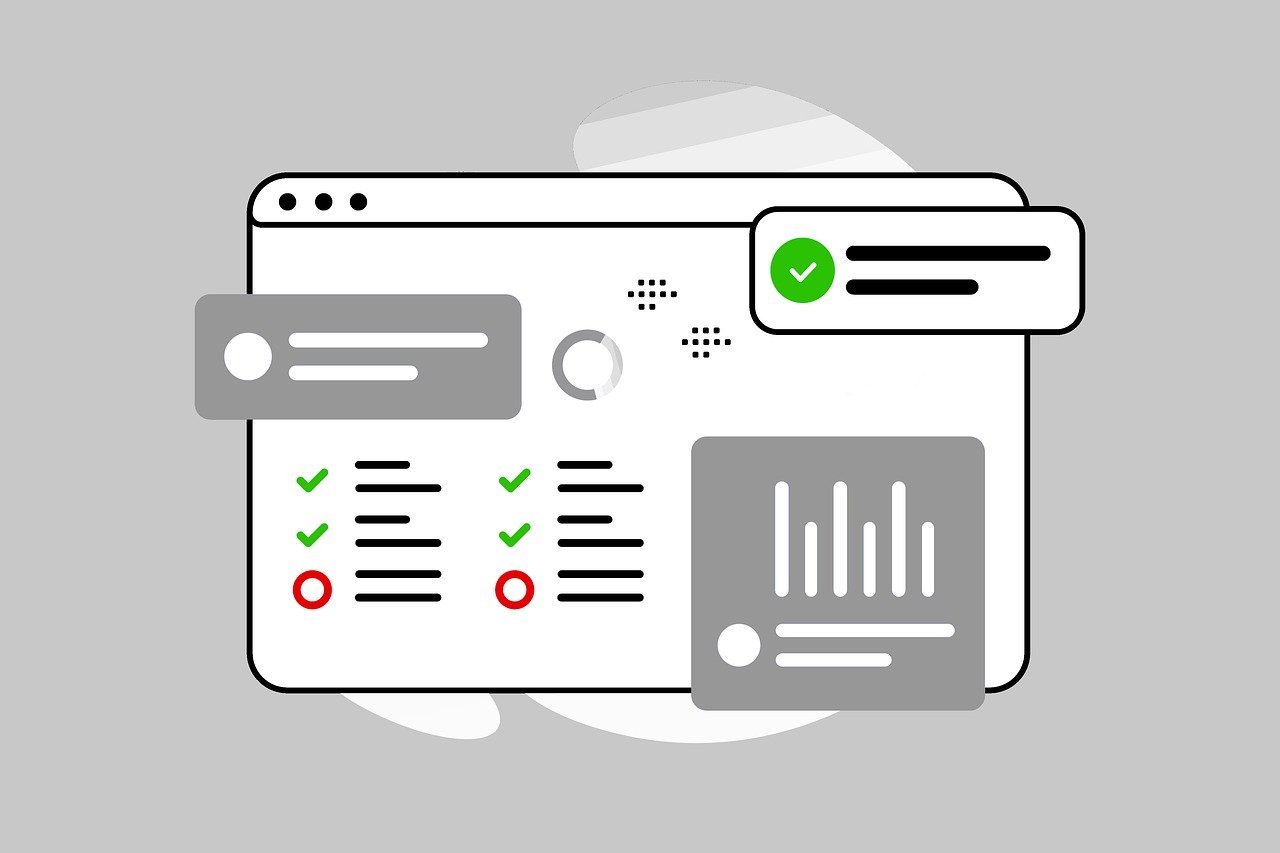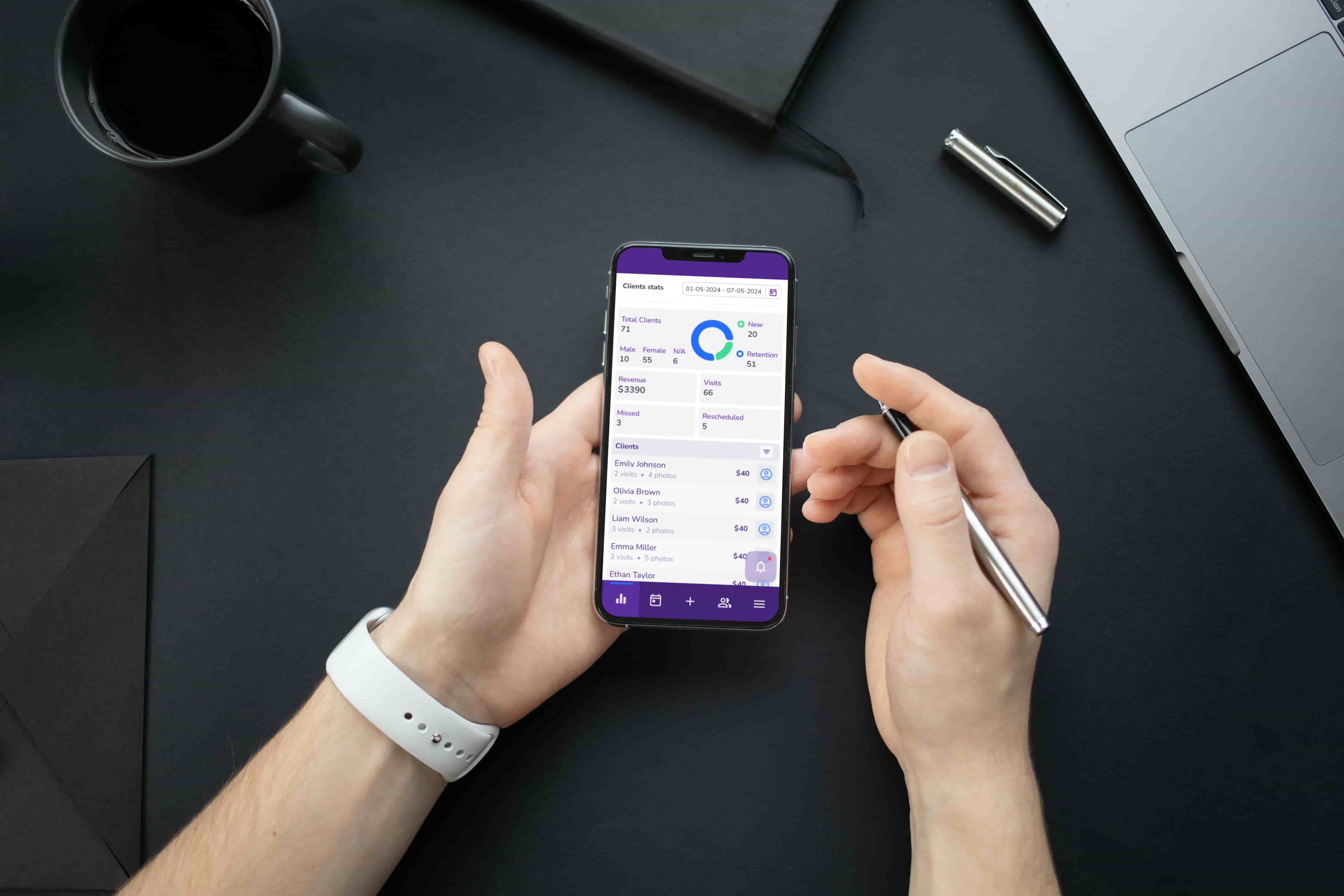CRM Development Basics Covered
CRM software solutions allow businesses to store customer information like contact information, purchase history, preferences, and conversation history in one place. This gives companies a full picture of every customer and lets them connect with them in a closer way and send more relevant marketing content. A good CRM helps business owners keep an eye on interactions with both potential customers and current ones.
Businesses want to buy CRMs in different niches because they get:
- Tailored communication results in higher conversion rates and loyalty
- Sales performance is boosted with automated follow-ups and other marketing strategy tools
- Respond quickly to changing market needs and get ahead of the competition
- So many opportunities for marketing efforts
- Overall better customer service
The need for CRM is undoubtedly, but the key is in proper development. Let’s explore all the essential steps of the CRM development process to help you build a CRM leader in the niche.

CRM Development Process: Essential Steps
Because CRM is a difficult system with many connections, you should hire a CRM development team to handle any problems that may come up when you start from scratch and build a CRM system. You can go with one of these three options:
- Freelancers. People are hiring freelancers more and more these days. However, CRM development needs long-term collaboration, and freelancers often switch jobs and may not give your project enough attention.
- In-house developers. You can keep an eye on the development process and make sure everyone is on the same page if you get an in-house tech team. That being said, this choice is the most expensive because it includes rent, gear, software, taxes, and other costs.
- Dedicated software developers. Many businesses choose to outsource CRM development to a third-party IT partner because the prices are low and the work is of high quality. You can also hire a dedicated development team to make a CRM just for you. This way, you’ll get a team of specialists who have the experience and knowledge you need.
Our experience has shown that hiring a CRM software development team is the best way for your business to get a CRM quickly and without breaking the bank while also taking advantage of expert skills.
Step 2: Do a study of the business needs
When you find a good CRM software development company, it will help you get ready for the project’s growth. For example, if you want to work with ArtCodeVision, you’ll get an in-depth consultation with our specialists to align our visions. Our team will pinpoint the problems and needs of your business that a custom CRM development for your company is about to fix. So, they come up with a project plan, a great list of features, and a rough sketch of the design of the CRM system you will soon have.
To make your future CRM better and become popular among businesses, you need to make sure that your product targets the needs of your niche. If you plan to create a CRM for salons, restaurants, or healthcare institutions, they have unique needs, and considering them is a guaranteed way to success.
Step 3: Design and build the CRM
UI/UX designers work on building the interface of your new CRM at the same time as all the Discovery stage activities. They start by coming up with a design idea and making prototypes while providing other UI/UX development services. Then, the process of building the actual CRM starts.
During the development stage, software engineers build the CRM platform’s server and website and add APIs so that data can be shared with other apps. Once the CRM development is done, your integration specialists should add other business software (like marketing automation software, document management software, or scheduling systems) to make sure that all business tasks are covered and that it makes the most money possible through system benefits.
QA engineers now use both human and automatic tests to make sure that every part of the newly built CRM works as it should. This is done to make sure that the CRM meets its functional requirements and that there are no running problems. Before your final review, the CRM development team checks all of your CRM’s features, such as its security, efficiency, and ability to integrate with other systems. This is done to make sure that it works as planned and meets the needs of the project.
Step 4: Release and provide assistance
Once the product is done, your CRM development team helps you launch it. Please keep in mind, though, that the custom CRM is a difficult system with a lot of different parts that work together. This means that you may need to support and improve your software all the time to make it work well.
So, it’s best to get CRM maintenance and support services from the company that makes CRM software. Usually, maintaining a CRM project means solving bugs, making the system more stable and faster, cleaning up and optimizing the code, making sure it works with the newest OS versions, adding new custom features, and making sure it works with the newest versions of third-party services.

What are the key features to include in a custom CRM system?
There is no one-size-fits-all answer when it comes to how the CRM system works. Here is a list of important CRM features that you should add to get the most out of the development process:
- Contact management. It puts all of a customer’s information, like conversation records and social media activities, in one place, so you can access and control it.
- Sales tracking. You can keep an eye on your sales flow, leads, possibilities, and results with sales tracking.
- Lead management. Automatically collect leads from different sources, divide them into groups based on criteria, and help them move through the sales process.
- Scheduling. Tracking assignments and activities helps you keep track of your meetings, activities, and tasks more easily.
- Notifications. Emailing and marketing tools make it easy to talk to people directly and keep track of marketing efforts.
- Automation of workflow will get rid of the need for human work, making things run more smoothly.
- Dashboards and reports that can provide real-time information, help you track success, and help you make better decisions.
- Document management makes it easier to store, share, and keep track of work papers.
- It’s better to have customer service and support to handle tickets faster, keep track of service problems, and keep a knowledge base up to date.
- Mobile app version. Being mobile-friendly is a must, but also having a separate app version is also a great decision for some CRM niches.
- APIs make it easy to connect to apps and tools from other companies.
- Tools for analyzing data and making predictions to use advanced analytics for analyzing customer data and making predictions about sales.
- Security features. User authentication, data protection, and access limits are some of the security features that keep the system safe.
Also, it’s key to make sure that your CRM product is easy to use, has intuitive navigation, and is ready for scaling. Also, remember about compliance so that your CRM system follows all private and data security laws.

What team do you need to build a robust CRM system?
To handle all the parts of CRM development, you need to hire experts with a wide range of skills and knowledge. You may be wondering how many people you should include. There is no right answer. What you need depends on the size and scope of your project. Usually, CRM development includes the following key roles:
- Front-end and backend developers
- UI and UX designers
- Mobile app developers (optional)
- Integration specialists
- QA experts and PMs
- Engineers in DevOps
- Experts in business information and data analysis
- Experts in compliance
Putting together a suitable team makes sure that the CRM system is handled carefully from the beginning, all the way through rollout and upkeep. If you’re still unsure what specialists to get, you can outsource the CRM development to companies like ArtCodeVision. This way you get all the specialists you need without spending on recruitment and onboarding.
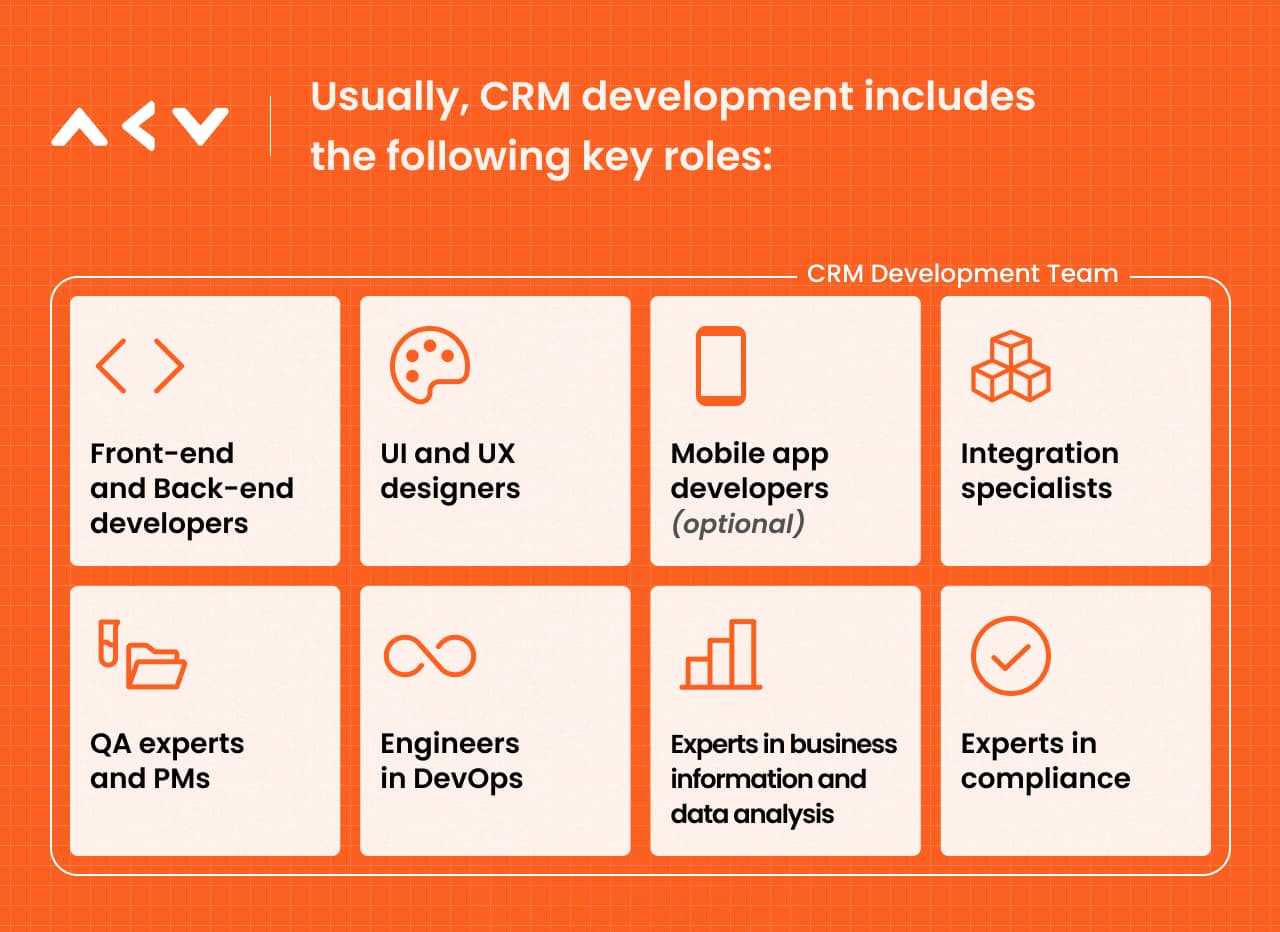
How long does it take to develop a CRM system from scratch?
When you want to start a CRM business, it’s natural to want to make everything happen fast, but without compromising the quality. Yet, it’s not always possible.
What determines CRM development timelines? How long should a team spend on such a project? If put short, there is no set time.
CRM development estimates depend on the tech stack, development team size, skills, and location, domain details, third-party integrations, development stages, and system complexity. We outlined CRM system development. For the most accurate time quote, you need a project-specific estimate. But you can also use this overview:
- Pre-development. The project planning and initial meetings take around 2 weeks and include establishing the scope and determining needs and requirements.
- Development. This 1-3 month process involves creating the CRM system’s architecture, including database, UI/UX, and system flow. But it can also take up to 6+ months, depending on the system’s complexity and desired features.
- QA testing takes up to a month and involves checking for bugs, mistakes, and compatibility across devices and browsers.
- The deployment and launch stage, lasting 1-2 weeks, comprises data migration, system setup, and final testing before launch.
To get a personalized time quote for CRM development at ACV, just drop us a line.
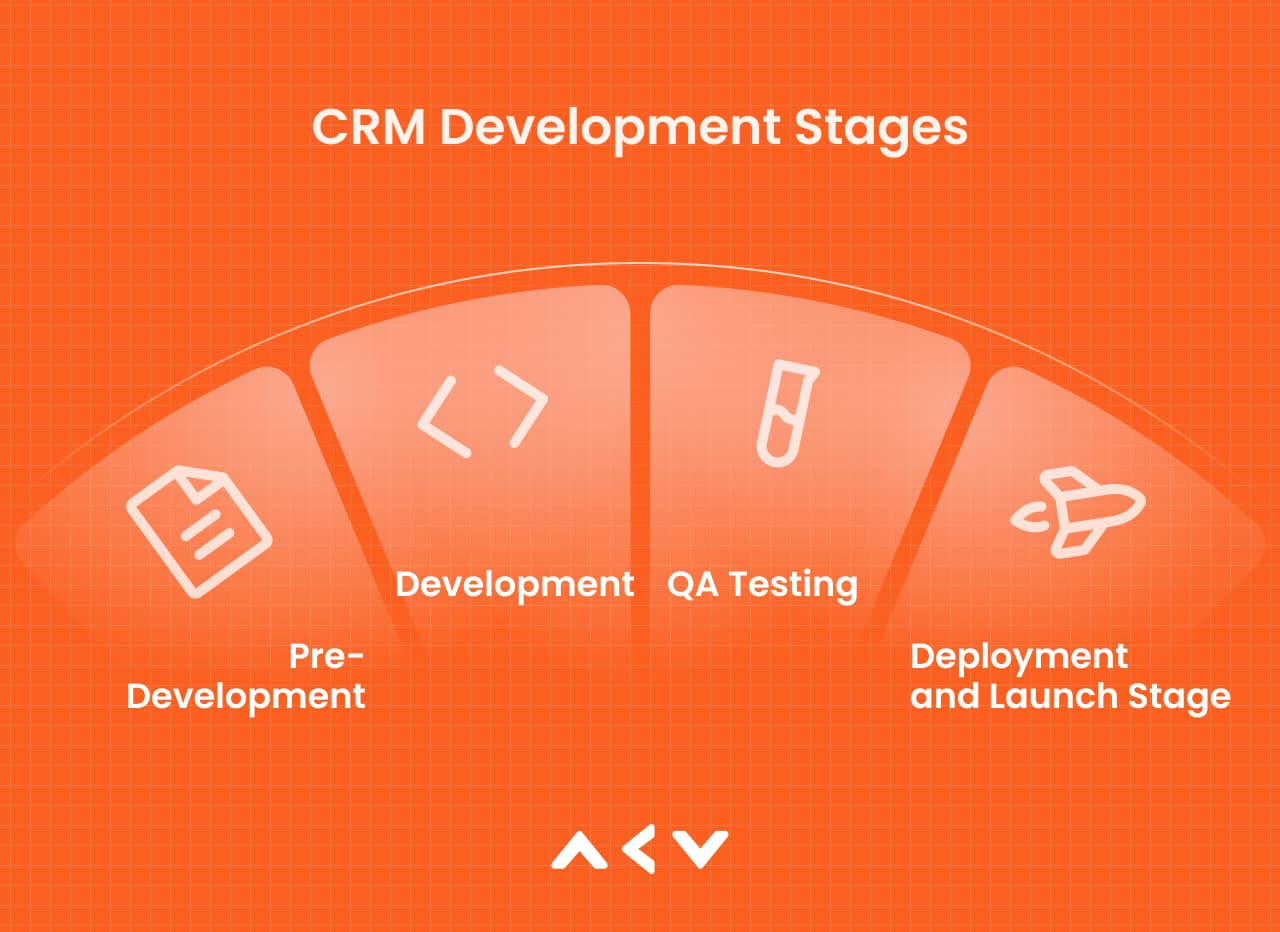
What are the CRM development challenges and how to overcome them?
CRM software is slowly but surely becoming an important part of any business that wants to run well. Now, 80% of business leaders around the world use CRM software to keep people interested, give great customer service, and connect with their audience on a deep level. However, the process of making a successful CRM is not challenge-free.
Let’s talk about the most common CRM development challenges and how to overcome them.
Problem: Getting users to adopt
Solution: Put end users’ needs and wants first, address their worries, hold training classes, and make sure everyone knows what the new system can do for them.
Problem: Integration and data quality
Solution: Set up rules for validating data, clean up data before transfer, and build strong integration systems.
Problem: Finding the right level of customization flexibility
Solution: Put important customization features at the top of the list, make sure the customization tools are easy to use, and provide good instructions.
Problem: Scalability and data load
Solution: Use cloud-based infrastructure, make sure that database queries and code are always running at their fastest, and review and change the system design regularly to strive for growth.
Problem: Integration with existing systems
Solution: To make sure data flows smoothly between systems, use common APIs, tools, and interaction platforms. Test the system to find and fix problems with connectivity.
Problem: Accessibility
Solution: Use flexible design and tools that don’t depend on the platform to make sure that the experience is the same on all devices and platforms.
Problem: Keeping client information safe
Solution: Use encryption, strong verification, and regular security checks.
It takes a lot more than picking the right CRM development tools for your business to be successful. A return on your investment must be very important to you. To do this, make sure the system is set up correctly and is managed well. The best way to ensure that is to partner with professional CRM developers.
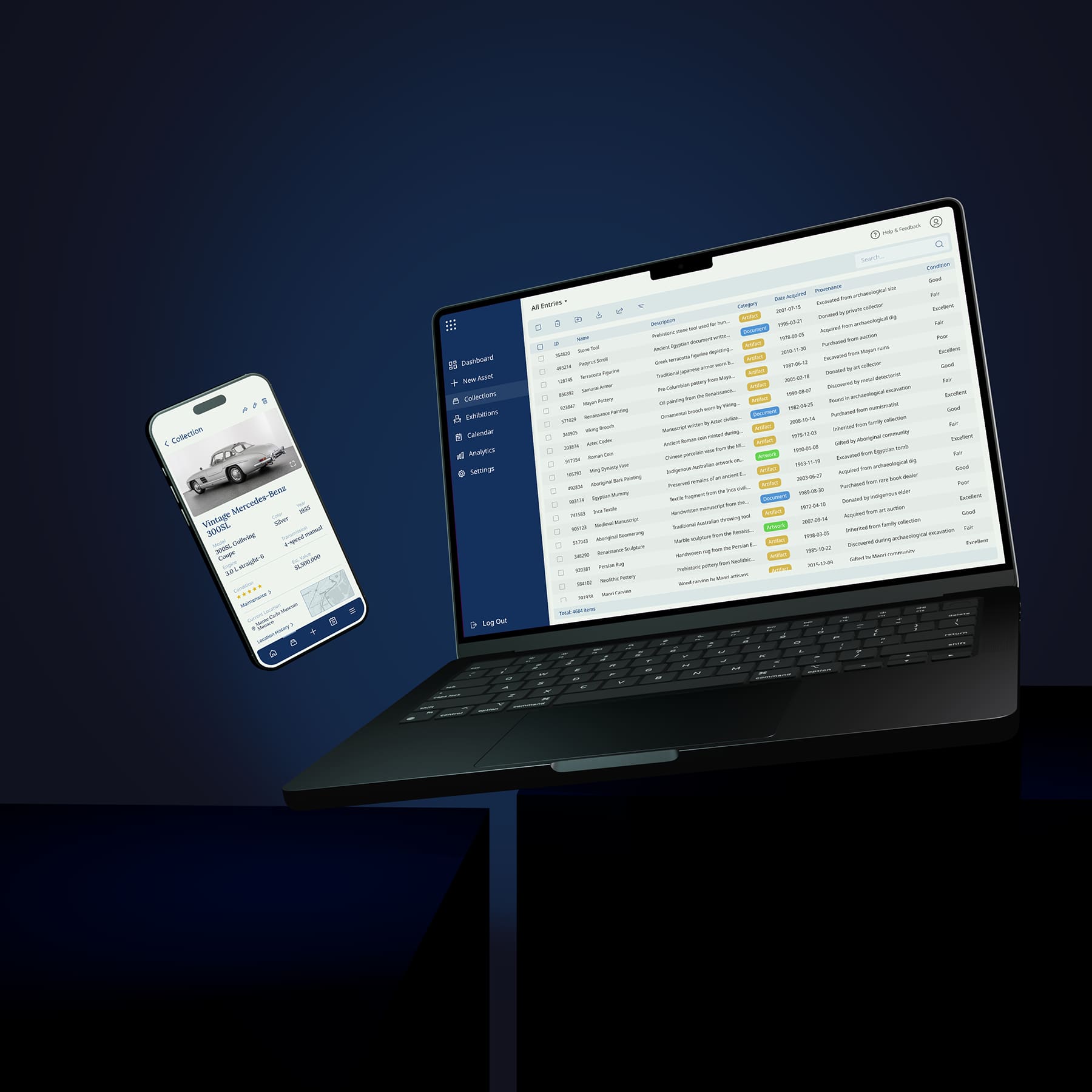
ArtCodeVision expertise in CRM development
ArtCodeVision professionals build strong CRM systems for startups, small businesses, and big companies in fields like healthcare, logistics, retail, education, and more. When you work with us, you’ll get:
- First-hand experience building CRM solutions for a variety of business types
- Our expertise that goes beyond building just CRM systems from scratch. We can also help with UI/UX design services, making cloud apps, and more.
- Giving multiple users of CRM the ability to set up different levels of access to CRM parts
- Knowledge of how to connect your custom CRM to third-party apps like SurveyMonkey, Slack, Zendesk, Automate.io, and more
- Timely delivery within your budget
- A team of devoted CRM and development specialists who are striving to make your product succeed
Technology changes faster than business adapts. Developing an advanced CRM system is an in-demand investment, as businesses want to have an edge over their competitors. So, if you are ready to be a CRM leader in any niche, get in touch with the ArtCodeVision team, and let’s create magic together!
